Call to Innovation is a call for action. For the fourth time, Spain is gathering its future leaders and encouraging them to propose projects to resolve the country’s biggest problems. Actually, not only in Spain, but from any country. In the future we can expect much more unemployment when jobs will become obsolete due to technology. Think about robotics and self-driving vehicles: no more taxi-drivers, delivery men or manufacturing personnel will be needed. New jobs must be created.
This is only one of the directions within the call to innovation. The objective is formulated as follow:
“HOW WOULD YOU SOLVE SPAIN’S GREATEST CHALLENGES (UNEMPLOYMENT, EDUCATION, FINANCIAL CRISIS, ENERGY DEPENDENCY…) AND IMPACT THE LIVES OF 10 MILLION PEOPLE IN SPAIN THROUGH THE USE OF TECHNOLOGY?”
Anyone residing in Spain who feels that he or she can make a change should apply, but only two will win the scholarship of €24.000 to participate in the Graduate Studies Program at the Singularity University in Silicon Valley being made available by the foundation Rafael del Pino and Cosentino. However, all will become members of the Spanish community and will benefit from the services of the Global Incubator, a former Spanish Call to Innovation winner. On this platform, the best ideas will be crowdsourced, teams will be composed and even crowdfunding will be an option. All to support disruptive changes that have a positive impact and can reach 109 citizen.
Why is this such a great opportunity? First of all, it is time to break the cycle of negative information flow about Spain. It is a way to show the international community our bright side, the passion that exists in Spain and how that enthusiasm is translated into game-changing entrepreneurship. The competition calls for optimism, ambition and building the future, but most of all innovation. There are global impact competitions in 16 countries.
A second reason to get involved is that it will give you access to state of the art, front-end education. The Singularity University is an unaccredited university, because they change their program every two months. Why? Because technological progression is requiring to do so in order to stay up to date. “We can’t tell our students what they should know 5 years from now, because we just don’t know.” This means most learning will happen after university, on the job and in the workplaceitself, or during these kind of special programs.
The Graduate Studies Program wants to create a group of 80 bright minds from 40 nationalities that together have the capacity to change the world. It is a mix of business, philosophy, technology and social causes. Become the leader of the future and become a role model to your peers. Something worth fighting for, isn’t it?
Although you have to apply with a project, they are actually searching for you as a person. Spain’s Ambassador Juan Martinez explained: “The projects are an excuse to get to know the person.”
According to this philosophy, Salim Ismail, founding executive director of Singularity University, was invited to inspire us with his leadership. He kicked off with an example to set the pace: the high speed pace of the evolvement of technology.
“We are witnessing a profound acceleration and intersection between technologies, leading to exponential growth. If the top speed of a car would have evolved in the same pace as that of computer hardware, we would now be able to drive faster than light!”
Central in his talk was the exponential growth (Moore’s law) and the fact that life is information based. Frankensteinian possibilities might arise with glow in dark animals. But directing biology also provides new (smart city) solutions. What if we could make glow in the dark trees along roads? No more street lighting will be needed. DNA sequencing costs have been fastest decreasing cost from millions to a couple thousand dollars in a few years’ time. So watch out where you leave your DNA, you never know what someone might do with it. Another achievement is the fact that, for the first time in history, technology is accessible to the poorest people in the world.
How does he see the future? In 20 years, there will be no more manual labor in the world, all will be robotized. A robot does not need salary, education, coffee breaks and will not go on strike. How do we handle this? What will all those people start doing? The shift to robotic vehicles will lead to the extinction of traffic accidents, since they react faster, don’t fall asleep and don’t get distracted. Millions of lives will be saved. Within due time everybody will have a 3D printer at home, imagine the social disruption for the Chinese economy, which is based on manufacturing, shaping and exporting plastics. These major technological changes will evoke huge societal consequences for politics, regulatory frameworks and governance. They are not designed for it; they don’t know how to cope with it. Update is needed on privacy, identity, anonymity and surveillance.
The presentation from Salim was highly inspirational, making you want to be part of the experience. You want to learn more about new ways of thinking of problems and about breakthroughs in ‘digitize’ (transforming in digital beings, from material driven (scarcity is dominant) to digital base: marginal costs go to zero, but resulting in other problems: abundance mentality, where do we find the information?), ‘dematerialize’ (3D printing/ digital fabrication: make objects repeatedly that can’t be molded and where complexity does not have to cost more. With 3D printing complexity is becoming free and this already counts for 70 materials), and ‘demonetize’ (new propositions and jobs; technology will replace 80% of doctors in 10 years). But it also leaves us with a lot of questions about what consequences all that change will evoke. And what do we want to reach?
To be part of this inspirational journey, take your chance and apply before March 9th to Call to Innovation. Good luck!

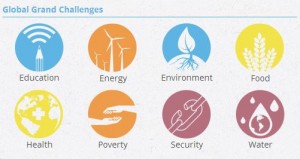
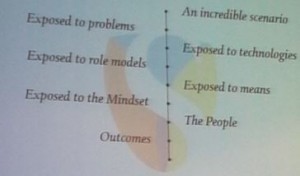
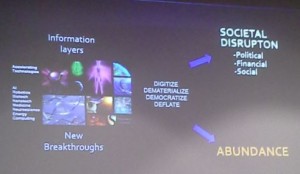
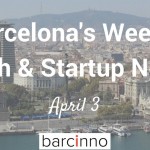


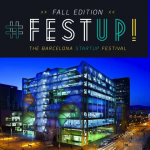


Leave a Reply